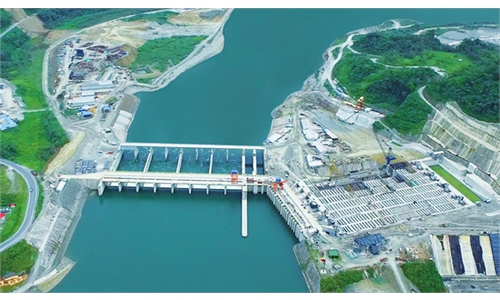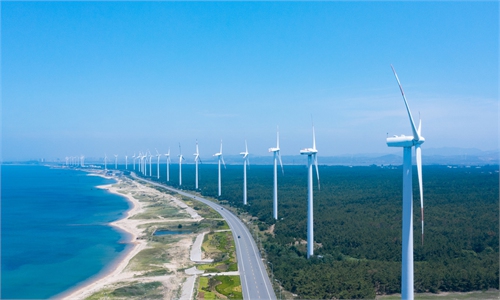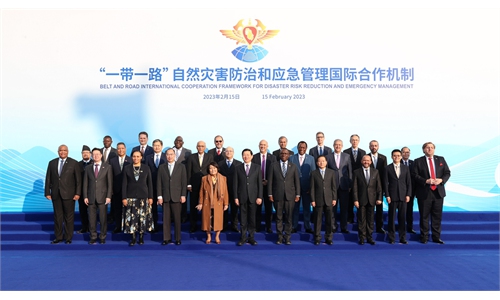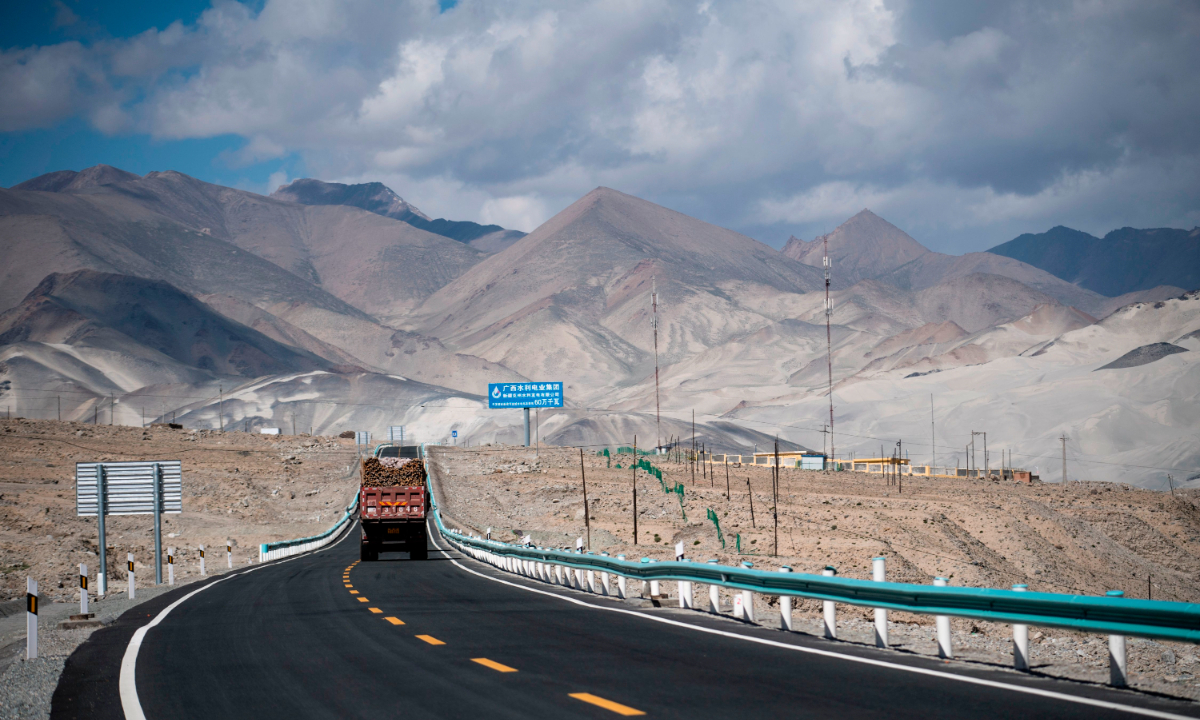
Photo taken on June 27, 2017 shows a truck driving along the China-Pakistan Friendship Highway before the Karakorum mountain. Photo: VCG
China plays a vital role in international infrastructure buildup, especially under the China-proposed Belt and Road Initiative (BRI). Foreign envoys have hailed China's overseas infrastructure projects, saying they have brought tangible socioeconomic benefits to local communities by promoting connectivity and creating jobs.
Diplomats in China told the Global Times that people in their countries have spoken highly of China-built projects.
The interviews were conducted during a group visit to China Communications Construction Co (CCCC), one of the major Chinese companies that participates in the BRI. The group visit on Monday gathered 111 diplomats from 110 embassies and international organizations based in Beijing.
After having seen the presentation of benchmark projects and the innovative technologies of CCCC, some of the envoys gave a thumbs-up, while others exclaimed that China's progress is, by all metrics, remarkable.
Landmark projects
CCCC participated in the planning and construction of the China-Malaysia Friendship Bridge and the Peljesac Bridge in Croatia, which have become new local landmarks.
The Mombasa-Nairobi Railway has created up to 50,000 local jobs and become a major artery of local economic development. Nigeria's Laiki Deepwater Port, Pakistan's Gwadar Port and Cameroon's Kribi Deepwater Port have become engines for local economic and trade prosperity.
Apart from infrastructure development, training local people to improve their skills will help increase employment, which is conducive to social and economic development and reflects the social responsibility of enterprises, Chen Zhong, vice general manager of CCCC, told the Global Times on Monday.
"The BRI is a practical project. It's transformative for Pakistan's economic growth and has contributed to upgrading our infrastructure, and addressing our energy needs and employment generation. The BRI has contributed to overall economic growth in Pakistan," Moin ul Haque, Ambassador of Pakistan to China, told the Global Times on Monday during the group visit.
The China-Pakistan Economic Corridor has greatly contributed to changing the economic landscape in Pakistan in terms of infrastructure development and industrialization, said Haque.
"In the second phase, we are focusing on special economic zones, industry, agriculture and high-tech. Everything is in line with Pakistan's own policy of making itself an economic hub of business activity," Haque added.
China has been involved in the construction of many landmark projects in Pakistan. CCCC, for example, participated in the construction of a 118-kilometer highway linking Havelian and Takot in Pakistan, among other projects in Pakistan.
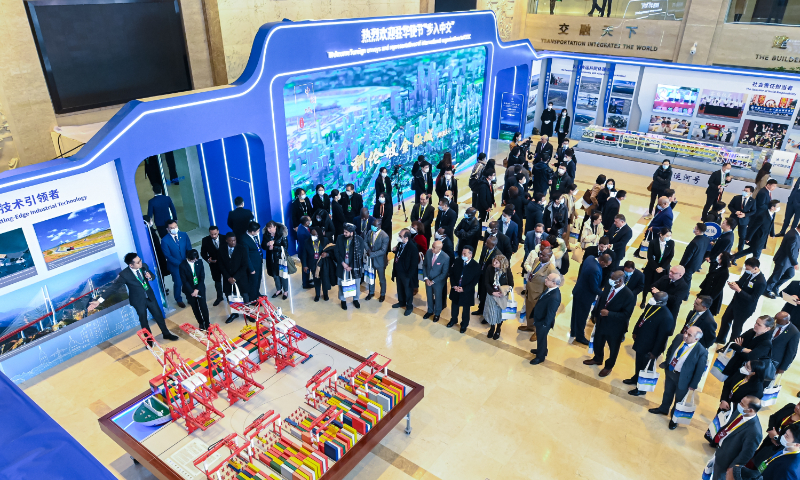
Foreign diplomats visit the exhibition hall of China Communications Construction Company (CCCC) in Beijing on February 27, 2023. Photo: courtesy of CCCC
Win-win cooperation
The BRI led to win-win cooperation for China and Africa, and actually for the entire world, because it promotes the movement of people and goods. There are investment opportunities, particularly for China in Africa, Njie Sulayman Omar, deputy head of the Gambian Embassy in China, told the Global Times.
"We are very interested in the BRI. We are also interested in having Chinese companies undertake various infrastructure projects in Africa," said Omar.
K. K. Yoganaadan, deputy chief of mission of the Sri Lankan Embassy in China, said that these infrastructure projects have improved the living standards of the people and also provided mobility and connectivity.
They play a key role in Sri Lanka. The Colombo port city, which is being built by CCCC, is a landmark project of the BRI.
"We are confident and hopeful that these BRI projects will help improve foreign exchange income for Sri Lanka and also attract more foreign investors," Yoganaadan told the Global Times on Monday.
"Infrastructure is very important in South Africa as one of the key elements of our post-COVID economic reconstruction and recovery plan.
"CCCC has done great projects here in China and elsewhere in the world. These projects will have a huge impact on our economy in South Africa," Siyabonga C. Cwele, South African Ambassador to China, told the Global Times.
Cwele said that he is happy that CCCC won a contract from the South African National Roads Agency in November 2022 to build the Mtentu Bridge project on the N2 Wild Coast Road, one of the most important links in the country, which will "scale up development in the whole area and improve the economic environment of the poor areas."
The agency said that the Mtentu Bridge project is "technically highly complex and challenging," requiring mega-bridge construction expertise and experience. China's construction industry is one of the world leaders in bridge building, local media reported.
Jaime Adriano FlorCruz, the Philippines' ambassador to China, told the Global Times that China's infrastructure has been quite amazing in the past few years.
"I know China's infrastructure 30 years ago was very poor and very backward, and China has made a lot of admirable progress. I hope that China can share its experience, technology and funding overseas so that other countries can benefit from China's experience and capability," said FlorCruz.
FlorCruz said that the Philippines hopes to benefit from some of the projects aligned with the BRI and can get more such projects.
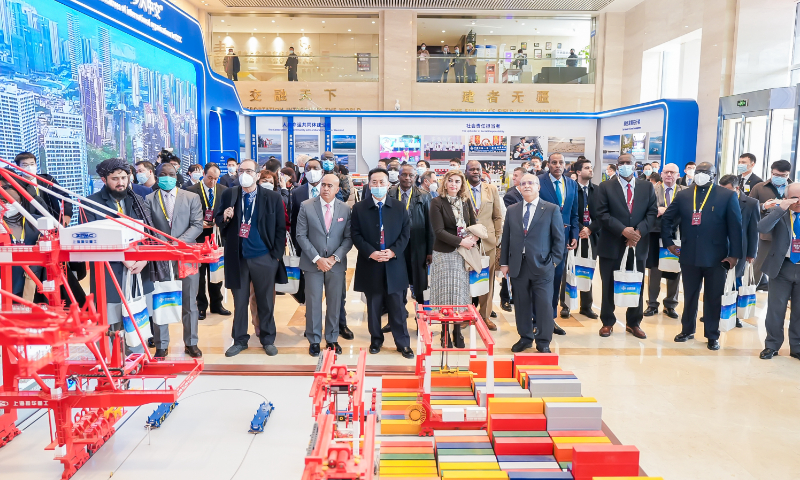
Foreign diplomats visit the exhibition hall of China Communications Construction Company (CCCC) in Beijing on February 27, 2023. Photo: courtesy of CCCC
Further cooperation
The year 2023 coincides with the 10th anniversary of the launch of the BRI. Many envoys have expressed their willingness to cooperate with China in transportation infrastructure to enhance connectivity, saying that the construction projects of their home countries are very much in line with China's BRI, which has brought huge development opportunities.
According to Haque, in the coming years, the focus of China-Pakistan cooperation will be on industrialization, mostly in export-oriented sectors such as automobiles, engineering, mining and oil, as well as agricultural modernization.
"There is a very promising future that I can see in terms of China-Pakistan cooperation and the BRI," said Haque.
FlorCruz also described future bilateral cooperation in infrastructure as "very promising."
"We have very high expectations that China can offer investments and technology transfers to the Philippines. I think China and the Philippines have complementary economies. So, we are looking forward to more cooperation that will benefit our country and our people," said FlorCruz.
For cooperation between China and South Africa, Cwele said that South Africa puts infrastructure at the top of its priorities and also emphasizes green development and transition of energy. Cooperating with Chinese entities in green energy will be good.
"We hope cooperation with China and its companies will produce win-win results for the common development of our people," said Cwele.
